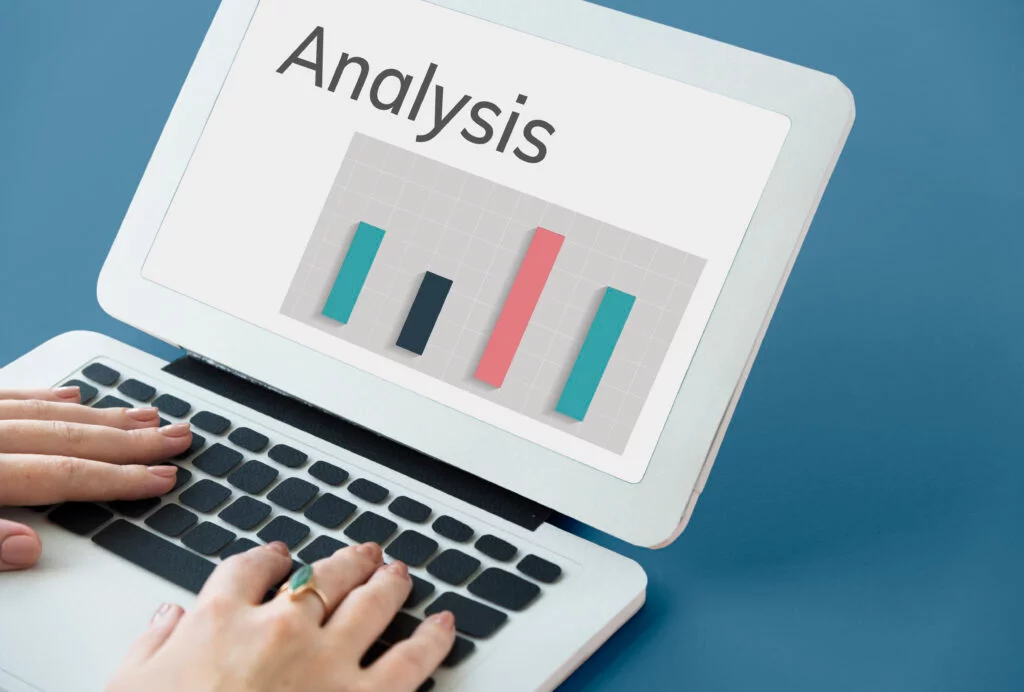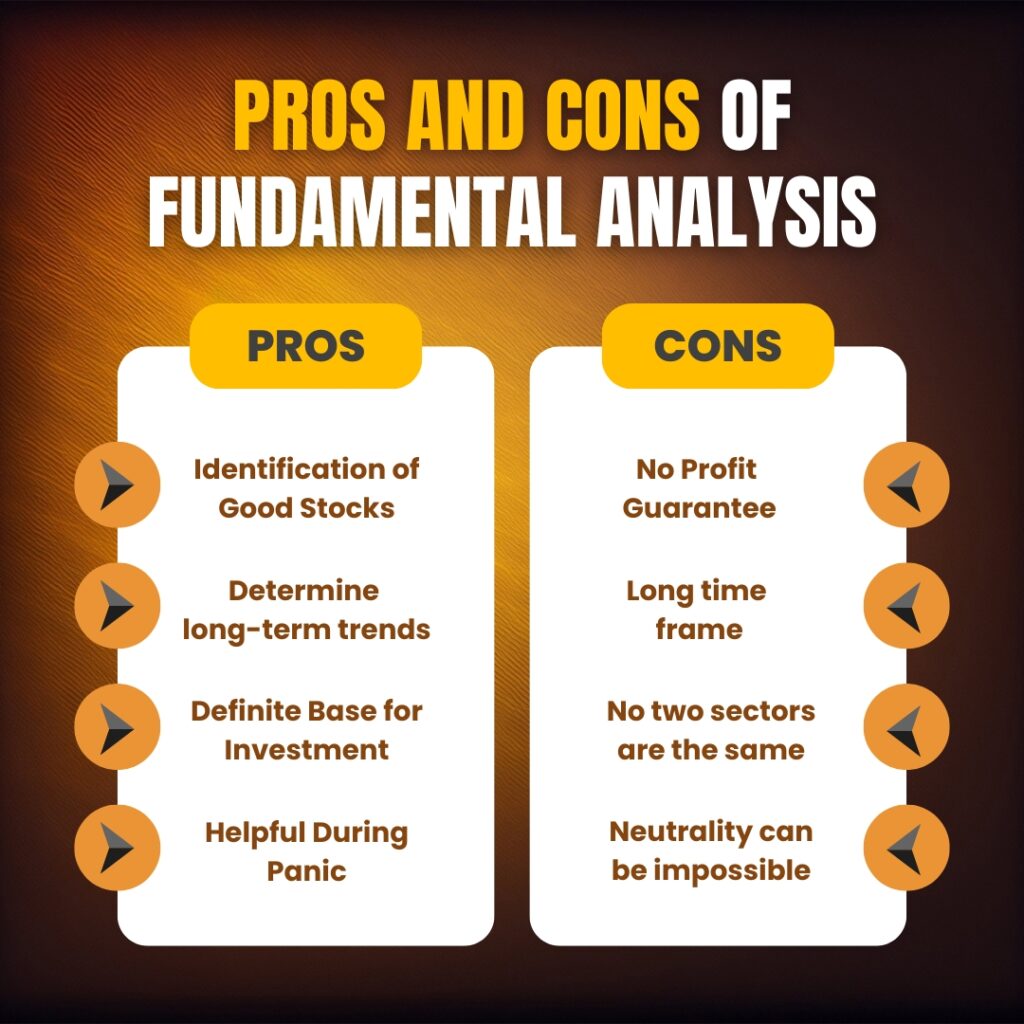Pros and cons of Fundamental analysis
Conducting fundamental analysis needs an investment of your time and action. In order to learn about the importance of fundamental analysis in trading, let’s view some of the pros and cons of fundamental analysis.
Pros Of Fundamental Analysis
Identification of Good Stocks
One of the biggest advantages of fundamental analysis is that it allows you to understand the various complexities of the stock market. Therefore, it enables an investor to identify the right stock with a great business model. And the future also helps to avoid wrong stocks.
Let us understand it with a fundamental analysis example, just like a great soldier who knows about landmines and avoids putting his foot in them.
Similarly, through fundamental analysis, a good investor can avoid putting his foot in the landmines to avoid picking any wrong stock. It is the most important pros in the list of advantages and disadvantages of fundamental analysis.

Determine long-term trends
Thus technical analysis typically identifies only the short-term practices and opportunities; a fundamental process will emphasize the businesses that deserve long-term investment.
It may serve you better if you are ready to take a patient viewpoint and choose to incur recounted dealing costs.
Here's a quick look at what you'll read
- Identification of Good Stocks
- Determine long-term trends
- Definite Base for Investment
- Grow your business sense.
- Helpful During Panic
- Understand market change
- No Profit Guarantee
- Long time frame
- No two sectors are the same.
- Neutrality can be impossible.
Everything has its merits and demerits. However, financial markets function based on prediction. That’s why fundamental analysis is crucial in making these predictions accurate.
Definite Base for Investment
Suppose you don’t know about fundamental analysis or technical analysis. Stock markets are like an underpass. In that case, you can be lost in that underpass, and fundamental analysis is a torch that gives you the brightness to get into the tunnel of the stock market.
In simple words, when you are satisfied with your selection and have lots of stocks to purchase, then fundamental analysis can assist you in finding the best stocks among good stocks.
Grow your business sense.
By taking out extensive studies with the help of fundamental analysis tools, you will increase your detailed knowledge of how these companies operate, understanding their sectors and methods of earning revenue and profit. It can be vital in identifying which companies to avoid and when it’s the correct time to purchase a stock.
As you become aware by analyzing the balance sheets and income flow report, you will also know the variable levels of volatility and risk that spread to other sectors and companies. For example, tech stocks are typically viewed as more variable, revealing you to higher risk than usefulness.
Helpful During Panic
In a panic situation, each investor selling stock who has accomplished a fundamental analysis of their holding shares will never panic because every good or bad stock falls. If your fundamental analysis is strong, the stocks recover quickly whenever the stock market recovers.
For example, you will not be concerned about heavy rains when you have an umbrella. Similarly, having a solid fundamental analysis keeps you safe during trading in Forex or any other financial market.
Categories shares correctly
Businesses are always subordinate to change, and as the environment develops, the companies can grow to success or drop from grace—a business understanding obtained by fundamental analysis that can assist you in organizing it perfectly.

Cons of Fundamental Analysis
No Profit Guarantee
One of the biggest disadvantages of fundamental analysis is that there is no guarantee that the investor will make a profit if they have recognized an undervalued stock because undervalued stocks keep performing poorly for a long period.
But not all data is not available in the public domain. That’s the reason the fundamental analysis is incorrect or incomplete.
Long time frame
While the fundamental analysis may recognize the business that has been under or overpriced, it won’t necessarily tell the likely timeframe before the price of shares fluctuates with your review.
In a technical analysis, where the point to buy or sell can usually be indicated on a chart, there is no method of understanding how long it might take to ensure a profit.
No two sectors are the same.
The way you think of the company’s value will depend on the industry to which you belong. Each time you watch a new company in an unknown sector, you will likely need to utilize a distinct method entirely. You will need to limit yourself to only one or two industries.
Neutrality can be impossible.
When calculating a business’s fair value, you usually create assumptions about unstable factors and expectations or the government’s tax policy. But the assumption is entirely emotional and subjective as much as you can evaluate numerous scenarios and outcomes to allow for the fact that your idea may be overly bright.
Companies turn their news.
Most of the news related to stocks & indices comes through fundamental analysts. By hiring investor relations managers, these companies offer any layoffs that entirely reflect their performance possible. They give announcements about the market with a little pinch of salt.
Wrapping up
We have discussed the major pros and cons of fundamental analysis in trading. Everything has its merits and demerits. Fundamental analysis also has some advantages and disadvantages. However, Forex, Comex products, indices and other financial markets are based on the prediction. Your profit depends on your prediction.
That’s why fundamental analysis is crucial in making these predictions accurate. However, you need to conduct the procedure of fundamental analysis effectively to remove the chances of its negative effects.
